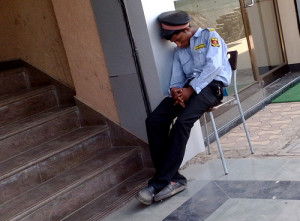 Later this week I have the privilege of speaking at and attending the DRI Retail & Hospitality Litigation and Claims Management Seminar taking place in Chicago, IL. I will be speaking with the vice president of security for a major grocery store company and we will discuss drafting security manuals and hiring security staff.
Later this week I have the privilege of speaking at and attending the DRI Retail & Hospitality Litigation and Claims Management Seminar taking place in Chicago, IL. I will be speaking with the vice president of security for a major grocery store company and we will discuss drafting security manuals and hiring security staff.
I already posted some of my articles on security policy development so I want to take this opportunity to provide some tips on hiring security staff. Lucky for me, I have worked with some amazing security professionals over the years (including my co-presenter), so I will rely heavily on what they have all taught me about this topic.
In-House vs. Vendor Security Staff
At some point in time, most retailers, restaurants and hospitality companies need to hire security staff on either a part-time, full-time or event basis. When this need arises, the first question is whether to hire in-house employees to fill the role or to hire outside vendor security staff. Here are some pros and cons of each:
- Having in-house employees allows security directors to have more control over the company’s security department;
- Having In-house staff allows more control over who is hired, the type of training provided and discipline of the employees;
- In general, in-house employees tend to be more dedicated to their job and they perform better at their jobs because they are vested in the company;
- Security vendors are usually more cost-effective than having in-house employees;
- There are no scheduling issues when security vendors are used so shifts will always be filled; and
- Most security related claims and litigation can be transferred to the vendor when vendor personnel are used for security.
Undercover Loss Prevention vs. Uniformed Guards
While preparing for my upcoming presentation, one thing I learned was that deciding between an undercover loss prevention officer and a uniformed guard is not always as easy as it seems. I assumed undercover officers were hired for preventing theft while uniformed guards were hired to stand at the front and provide a presence. Actually, the decision of what type of guard to use should instead be made on a case-by-case basis, depending on the type of clientele and neighborhood.
In an area where shoplifters tend to be “professionals,” the use of undercover loss prevention is a requirement. However, if the store is near a college or high school and petty theft is the problem, a uniformed guard at the front is usually sufficient.
Be sure to listen to those working in the store because they have the best understanding of the real problems relating to each location.
The Hiring / Screening Process
Regardless of whether a company hires in-house employees or an outside security vendor, the hiring and screening process should include a review of the following:
- Overall experience, including all prior employment;
- Experience working in same type of industry;
- References (and these should actually be spoken to);
- Type of training received / provided;
- Familiarity with neighborhoods where security will be provided; and
- Licenses / Insurance.
Some potential red flags when hiring in-house employees are anyone with a criminal history and a guard with multiple civil lawsuits either against him/her or regarding his/her actions. These events in a guard’s history could be used against a company as support for a negligent hiring claim.
When hiring an outside security vendor, a few other things to look for are:
- Business structure and how employees are managed;
- Supervision of employees on-site;
- Consistency of guards to be provided at locations; and
- Cost.
Assessment of Security Needs
Once a decision is made regarding the type of security staff to hire, the process is not over, it is just beginning. The next step is to determine the specific security needs for each location. As most retailers, restaurants and hospitality companies know, it is an ongoing challenge to determine how best to perform property security assessments for each property location. Depending on the size of the company and the number of properties, this can be a daunting, challenging and expensive task.
The most common considerations for such an assessment are:
- Internal incident/accident reports relating to security issues;
- Communication with store staff and security investigators assigned to each property;
- Amount of theft at location;
- External crime statistics;
- Information obtained from speaking with other businesses in the area; and
- Information obtained from police, CAPS meetings and law enforcement in general.
Every company should have a procedure in place so it can be clearly shown what the company does to assess security needs on an on-going basis. The key to this type of assessment is reasonableness. Be able to prove the assessment was done often enough to reasonably comply with a duty of care and be sure the assessment is reasonable, considering the number of properties.
Happy Hiring! Hope to see you at the seminar!